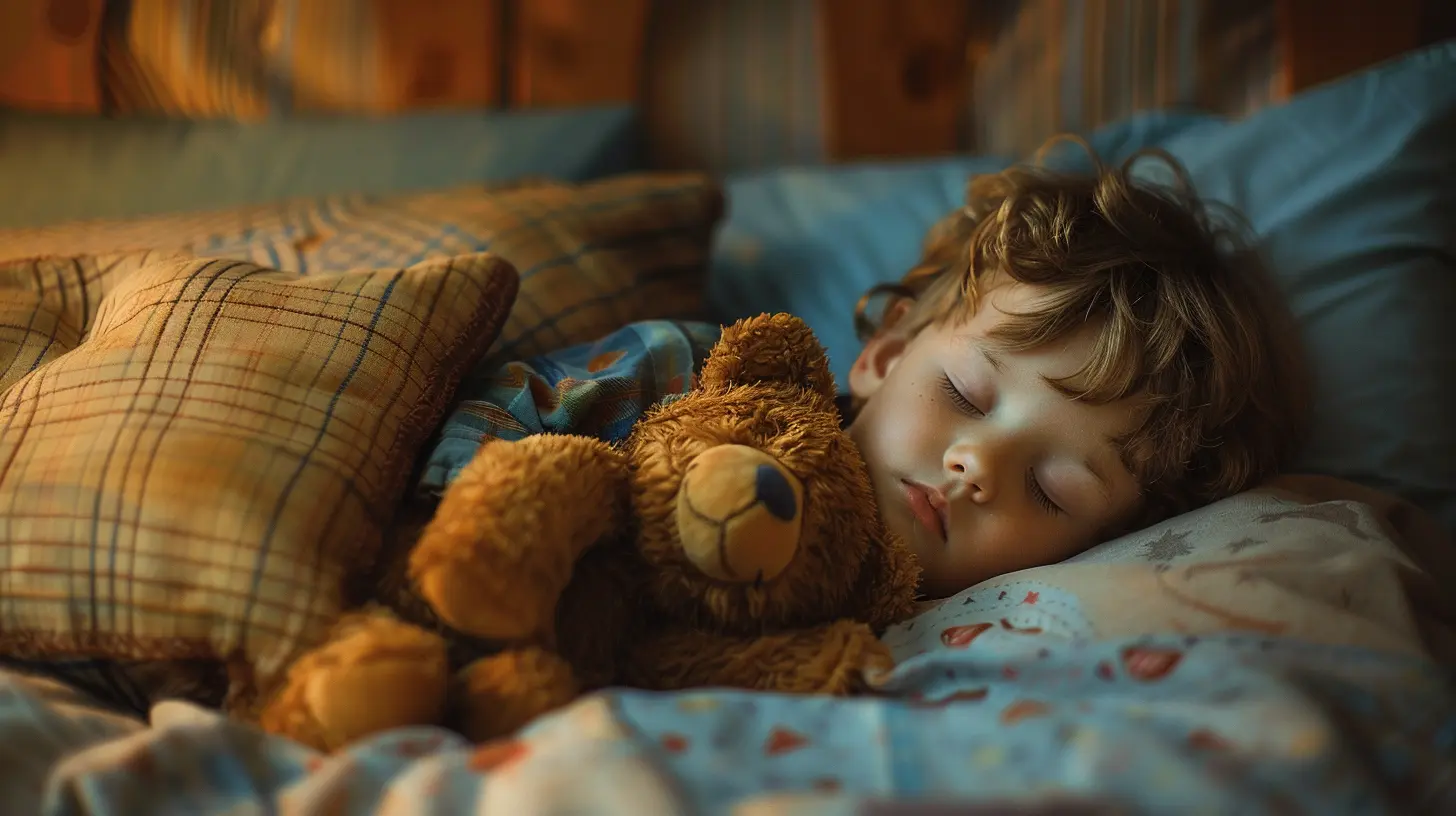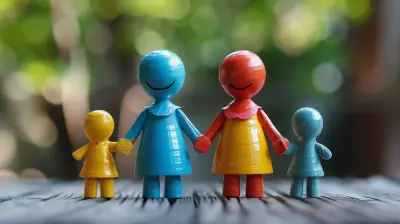Dealing with Sleep Challenges After a Big Milestone
1 June 2025
Everyone loves to watch their child hit major milestones—whether it’s first steps, first words, or transitioning to a big kid bed. However, something parents often don’t anticipate is that these milestones can throw sleep routines into complete chaos. One minute you’re celebrating, and the next, you're dealing with waking up at 3 a.m. more often than you did when they were newborns! Suddenly, sleep becomes elusive, and bedtime turns into a battle akin to preparing an army for a major war campaign. So, what gives?
Welcome to the Post-Milestone Sleep Shuffle
Let’s face it: parenting is full of surprises. Just when you think you’ve conquered one challenge, another pops up. And unfortunately, big developmental milestones often come with unexpected sleep regression or, at the very least, sleep disturbances.But don’t worry, we’ve all been there. From the emotional ups and downs to the sleepless nights, this phase will pass. Don’t despair; there are ways to navigate these turbulent waters. In the meantime, let’s dig a little deeper into why sleep tends to go haywire after your little one hits a big developmental leap, and more importantly, what you can do about it.

Why Do Sleep Regressions Happen After Milestones?
First, let’s clarify one thing: sleep regressions are normal. They typically occur at various stages of a child’s development, and a major milestone often serves as the trigger.1. Brain Overload
Think about this for a second—every time your child hits a milestone, their brain goes into overdrive. Imagine your brain running a marathon every single day. That’s essentially what’s happening when a child learns something new like walking, talking, or transitioning from crib to bed. Their little minds are processing tons of new information, and this can lead to difficulties relaxing enough to sleep. It’s like when you try to sleep the night before a big presentation, and your mind is racing with a million thoughts—that’s what’s happening to your toddler.2. New Fears and Concerns
Hitting a big milestone can sometimes lead to new worries. For example, after learning to walk, your child might develop separation anxiety because they can physically move away from you and realize they're more independent. Or after transitioning to a big kid bed, they may feel insecure without the crib rails confining them. This change in their environment can lead to fear and anxiety, which makes it harder for them to settle down and sleep through the night.3. Physical Exhaustion
While milestones like crawling or walking seem like they should exhaust your little one, all that physical activity can ironically rev them up—kind of like when you overdo it at the gym and instead of feeling sleepy, you feel wired. That burst of newfound energy could result in bedtime battles. Your child might also wake up more frequently at night because they’re eager to practice their new skill—even in the crib!
Common Milestones That Disrupt Sleep
Rolling Over
One of the first big milestones, learning to roll over, is often the cause of sleepless nights in infancy. Babies who learn to roll for the first time may practice this trick in the middle of the night, only to get stuck on their bellies, scared, and confused, waking up upset.Sitting Up
Once babies learn to sit up, you may walk into their room after a nap only to find them sitting in their crib, unable to lie back down. This can lead to frustrations and crying spells, which, of course, make sleep more difficult for everyone.Standing and Walking
Oh boy, once they start pulling themselves up and taking their first steps, you’re in for it. Kids who learn to stand or walk often practice their new skills non-stop, even at bedtime. Many parents find their toddlers standing in their cribs when they’re supposed to be asleep (or worse, climbing out!).Talking
Yes, even the magical milestone of talking can wreak havoc on sleep. Toddlers who are in their language explosion phase might start babbling to themselves or even calling for you during the night. Sometimes, they wake up in the middle of the night just to test out those new words they’ve learned throughout the day.Potty Training
Potty training can also be a big sleep disruptor. Kids in the process of potty training may wake up more frequently to use the bathroom or because they’re unsure about the sensation of needing to go. It’s another instance where their minds are processing so much new information that their sleep patterns get interrupted.
How to Deal with Post-Milestone Sleep Challenges
Now that we know why sleep can get off track after hitting a milestone, let’s talk about how to get things back under control.1. Be Patient
I know, easier said than done. But it’s crucial to remember that these sleep disruptions are usually temporary. Post-milestone sleep challenges tend to last only a few weeks (though it often feels like forever when you’re going through it). The more patient and consistent you are with your approach to sleep, the faster things will get back to normal.2. Stick to a Routine
If you don’t already have a solid bedtime routine in place, now is the perfect time to implement one. A consistent bedtime routine helps to cue your child that it’s time to wind down and go to sleep. Something as simple as bath time, followed by reading a few books, and then lights out can go a long way in creating a calm environment that promotes sleep.If your child has hit a big milestone, consider adding an extra calming ritual in the routine, like some gentle massage or lullabies. This will help reduce the excitement they are likely feeling from all the new skills they’re practicing.
3. Keep the Sleep Environment Consistent
When dealing with sleep challenges following a big milestone, make sure your child’s sleep environment is as familiar and comforting as possible. Avoid introducing new variables like new bedding, toys, or moving to a different room during this time. Keeping things consistent helps ease their mind and reminds them it’s time to sleep.For younger babies, ensure their crib is safe and they aren’t in a position where they might trap themselves, such as rolling onto their belly for the first time.
4. Recognize Over-Tiredness
When kids are learning something new, they can get overstimulated very quickly. If your child is practicing standing or walking all day, it can actually make them overtired, which paradoxically makes it harder for them to settle down and sleep. Make sure you’re offering naps and quiet downtime throughout the day. Don’t over-schedule activities, especially during these phases when their little brains are working overtime.5. Be Flexible
Things won’t go perfectly, and that’s okay. Some nights, you’ll win bedtime battles, and other nights, your toddler might end up in bed with you at 2 a.m. No journey through parenthood is linear, and sleep will regress from time to time. The key is to stay flexible. Some phases might require a temporary adjustment in your sleep expectations. Just remember to always go back to your original sleep routine once things settle down.6. Offer Reassurance
When big milestones bring up fear or anxiety (e.g., fear of falling out of their new big kid bed), be there to offer the comfort and reassurance they need. Sometimes this can be as simple as leaving the door slightly ajar or sitting next to them until they fall asleep. Over time, as they grow more used to their new abilities, they’ll likely settle down and regain their sleep confidence.7. Encourage Daytime Skill Practice
If your little one seems obsessed with practicing their new milestone at bedtime, let them work on those skills during the day. If they’re learning to walk, for instance, give them plenty of time to stumble around during waking hours to satisfy their curiosity. This can reduce their need to practice at night, giving them (and you) a better chance at restful sleep.
When to Seek Professional Help
Sometimes, despite your best efforts, sleep disruptions can linger longer than expected. If your child’s sleep patterns don’t improve after a few weeks, or if they seem to be progressively getting worse, it might be time to consult with a pediatrician or a sleep specialist. They can help rule out any medical issues and offer tailored advice to get everyone back on track.Final Thoughts
Sleep disruptions after hitting big milestones are incredibly common, but they don’t have to lead to long-term sleep struggles. By being patient, consistent, and understanding your child’s needs, you can help them navigate the post-milestone world without sacrificing too much sleep in the process. Remember, this too shall pass (even if it feels never-ending in the moment). Before you know it, your child will be excelling at their new skill and you’ll both be back to enjoying a full night’s sleep.all images in this post were generated using AI tools
Category:
Baby SleepAuthor:

Maya Underwood
Discussion
rate this article
2 comments
Briar Porter
Thank you for sharing these helpful insights on navigating sleep challenges after major milestones. Your tips are practical and reassuring for parents facing these changes. Looking forward to trying some of these strategies!
June 12, 2025 at 3:18 PM

Maya Underwood
Thank you for your kind words! I'm glad you found the tips helpful. Wishing you all the best as you navigate these changes!
Nell Larsen
Navigating sleep issues after a milestone can be tough. Remember, it’s normal! Stay consistent with routines, offer comfort, and be patient—it’ll pass. You got this!
June 2, 2025 at 3:55 PM

Maya Underwood
Thank you for your encouraging words! Consistency and patience truly make a difference during this challenging time.


